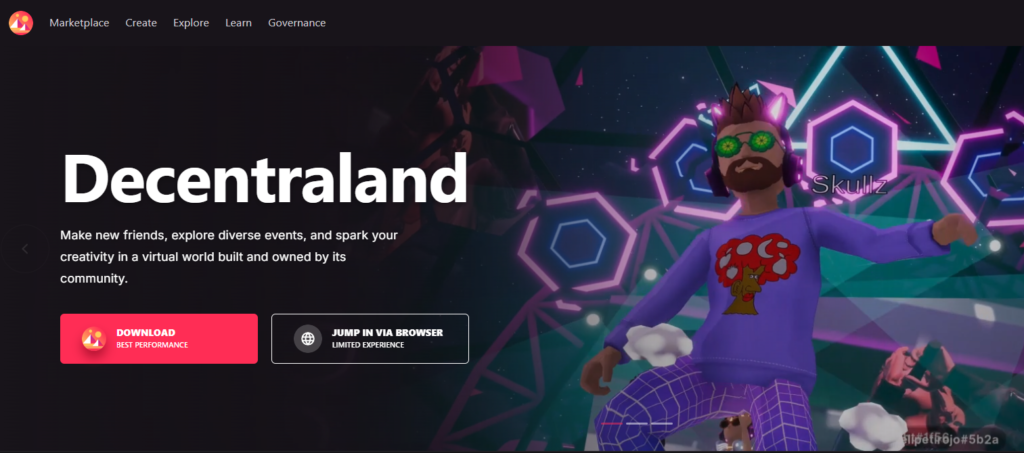
The metaverse isn’t just the next frontier of the internet; it’s a thriving virtual ecosystem where virtual real estate is becoming a hot commodity. The concept of virtual real estate has exploded in popularity, transforming pixels and code into valuable digital assets.
The concept of selling virtual real estate might sound like something out of a futuristic novel, but it’s happening right now. As the lines between our physical and digital lives continue to blur, savvy entrepreneurs are staking their claims in these virtual worlds, and the potential for profit is staggering.
In this comprehensive guide, we’ll explore the ins and outs of how to sell virtual real estate in the metaverse. Whether you’re a tech-savvy investor looking for the next big opportunity or a curious newcomer fascinated by the possibilities, this article will equip you with the knowledge and strategies you need to succeed in this exciting new frontier.
TL;DR
- Understand the basics of virtual real estate and the metaverse
- Research popular metaverse platforms and their real estate markets
- Create a strong digital presence and network within the metaverse
- Learn to identify valuable virtual properties
- Master the art of virtual property staging and marketing
- Develop effective pricing and negotiation strategies
- Stay informed about metaverse trends and technological advancements
- Explore partnerships and collaborations within the virtual ecosystem
- Understand the legal and financial aspects of virtual real estate transactions
- Leverage analytics and data to make informed investment decisions
Understanding the Metaverse Real Estate Landscape
The metaverse is a collective virtual shared space where digital real estate has become a hot commodity. To grasp this concept fully, let’s break it down:

- Virtual Worlds: Platforms like Decentraland, The Sandbox, and Cryptovoxels are pioneers in this space.
- Digital Assets: Virtual land, buildings, and even billboards are bought and sold as NFTs.
- Economic Systems: Each platform has its own currency and marketplace.
Example: In Decentraland, land is divided into 90,601 parcels, each represented by an NFT. These parcels can be developed into anything from virtual shops to art galleries.
Researching Metaverse Platforms
To succeed in virtual real estate, you need to know your platforms. Here’s a step-by-step guide to researching:
- Create accounts on major platforms (Decentraland, The Sandbox, Cryptovoxels, Somnium Space, Upland).
- Explore each world, noting popular areas and types of properties.
- Join community forums and Discord channels to understand user preferences.
- Use analytics tools like DappRadar to track sales and user activity.
Tool Spotlight: DappRadar provides insights into NFT sales, user numbers, and transaction volumes across different platforms.
Building Your Digital Presence
Your metaverse identity is crucial. Here’s how to establish a strong presence:
- Create a unique avatar that represents your brand.
- Build a portfolio website showcasing your virtual properties.
- Engage in community events and forums regularly.
- Consider creating educational content about virtual real estate on platforms like YouTube or Medium.
Example: A successful virtual realtor might host weekly “Open House” events in Decentraland, showcasing properties and networking with potential buyers.
To further enhance your digital presence and provide value to your audience, consider sharing informative content like this video on making your first dollar online: Make Your First Dollar Online (like this?).
For More Free Videos, Subscribe to the Rhodes Brothers YouTube Channel.
Identifying Valuable Virtual Properties
Location matters in the metaverse too. Here’s how to spot valuable properties:
- Use heat maps (available on some platforms) to identify high-traffic areas.
- Look for properties near virtual landmarks or popular districts.
- Consider upcoming platform developments that might increase property value.
- Analyze historical price data using tools like NonFungible.com.
Tool Spotlight: NonFungible.com offers detailed analytics on NFT sales, including virtual real estate transactions.
Virtual Property Staging and Marketing
Presentation is key in virtual real estate. Follow these steps to stage and market effectively:
- Use in-platform building tools or hire a virtual architect to design attractive structures.
- Create eye-catching visuals using 3D modeling software like Blender or SketchUp.
- Develop interactive elements that showcase the property’s potential.
- Use social media and metaverse forums to promote your listings.
Example: A luxury virtual penthouse in Cryptovoxels might feature an interactive art gallery, a rooftop pool, and panoramic views of the surrounding virtual city.
Pricing and Negotiation Strategies
Pricing virtual real estate requires a blend of research and strategy:
- Use platforms like OpenSea to compare prices of similar properties.
- Consider the potential for future development in the area.
- Factor in any unique features or utilities your property offers.
- Be prepared to justify your pricing to potential buyers.
Tool Spotlight: OpenSea, the largest NFT marketplace, provides valuable pricing data for virtual real estate across multiple platforms.
Staying Informed on Metaverse Trends
The metaverse evolves rapidly. Stay ahead with these steps:
- Subscribe to newsletters like MetaversePost and Metaverse Insider.
- Follow key influencers and developers on Twitter and LinkedIn.
- Attend virtual conferences like the Metaverse Summit.
- Experiment with new VR and AR technologies to understand user experiences.
Quote: As Mark Zuckerberg said, “The metaverse is the next frontier just like social networking was when we got started.” This underscores the importance of staying at the forefront of metaverse developments.
Partnerships and Collaborations
Success often comes through collaboration. Here’s how to build valuable partnerships:
- Connect with virtual architects on platforms like Fiverr or Upwork.
- Collaborate with digital artists to create unique property features.
- Partner with event organizers to host virtual gatherings in your spaces.
- Join or create a DAO (Decentralized Autonomous Organization) focused on virtual real estate development.
Example: A virtual real estate developer might partner with a famous digital artist to create a limited-edition virtual home, increasing its value and attractiveness to buyers.
Legal and Financial Considerations
Navigate the legal and financial aspects of virtual real estate with these steps:
- Familiarize yourself with smart contracts using platforms like Ethereum.org.
- Consult with a crypto-savvy accountant about tax implications.
- Stay informed about regulations through resources like the Blockchain Council.
- Use secure wallets like MetaMask or Ledger to store your digital assets.
Tool Spotlight: MetaMask is a popular cryptocurrency wallet that integrates with most metaverse platforms, allowing for secure transactions.
Leveraging Analytics and Data
Make data-driven decisions with these analytics strategies:
- Use Dune Analytics to create custom dashboards for tracking virtual real estate trends.
- Monitor user engagement metrics provided by individual metaverse platforms.
- Utilize heat maps and foot traffic data to inform property valuations.
- Track broader crypto market trends using CoinGecko or CoinMarketCap, as they often correlate with virtual real estate prices.
Example: By analyzing foot traffic data in Decentraland, you might discover that properties near virtual casinos have 50% more visitors, potentially justifying higher prices for nearby parcels.
Actionable Steps for Selling Virtual Real Estate
Young Tech Enthusiasts (18-25)
- Start with free-to-play metaverse platforms
- Create content (videos, streams) about your virtual property experiences
- Focus on trendy, social spaces like virtual clubs or galleries
Millennials (26-40)
- Leverage your social media skills for marketing virtual properties
- Explore virtual workspaces and professional networking venues
- Consider fractional ownership to enter the market with less capital
Gen X Investors (41-56)
- Apply traditional real estate knowledge to virtual markets
- Focus on long-term value and steady growth areas
- Explore virtual equivalents of familiar concepts (e.g., malls, office spaces)
Baby Boomers (57-75)
- Start with user-friendly platforms with simple interfaces
- Invest in virtual properties tied to real-world brands you trust
- Consider partnering with younger family members for technical assistance
Entrepreneurs
- Develop virtual businesses on your properties
- Create unique experiences to attract visitors and increase value
- Explore cross-platform opportunities for broader reach
Artists and Creators
- Use virtual land as a canvas for digital art installations
- Collaborate with virtual real estate developers for custom projects
- Create and sell virtual furniture or decorations for properties
Corporations
- Establish brand presence through virtual headquarters or showrooms
- Host virtual events or product launches in owned spaces
- Explore virtual advertising opportunities on prime digital real estate
Common Mistakes to Avoid in Selling Virtual Real Estate
Overlooking location importance:
- Use heat maps and traffic data to identify prime areas
- Analyze proximity to popular landmarks or high-traffic zones
Neglecting platform-specific research:
- Create a checklist of rules for each platform
- Join platform-specific forums and Discord channels for insights
Underestimating networking:
- Schedule regular attendance at virtual events
- Create a virtual business card or portfolio to share
Failing to secure assets:
- Use hardware wallets for large investments
- Enable two-factor authentication on all accounts
Ignoring market volatility:
- Set up price alerts for your assets
- Diversify across multiple platforms and asset types
Overpricing properties:
- Regularly compare prices on NFT marketplaces
- Consult with experienced virtual realtors for pricing advice
Neglecting engaging listings:
- Create virtual tours or interactive experiences
- Use high-quality visuals and detailed descriptions
Failing to consider long-term potential:
- Research platform roadmaps and upcoming features
- Analyze historical growth patterns of similar properties
Not staying updated on new platforms:
- Subscribe to metaverse news outlets
- Set Google Alerts for new metaverse project launches
Overlooking user experience:
- Gather feedback from visitors to your properties
- Regularly update and improve your virtual spaces
Statistics and Research
According to a report by MetaMetric Solutions, virtual real estate sales on the four major metaverse platforms reached $501 million in 2021, and sales in January 2022 alone exceeded $85 million.
Research from Grayscale suggests that the metaverse represents a $1 trillion annual revenue opportunity across advertising, social commerce, digital events, hardware, and developer/creator monetization.
Frequently Asked Questions
What exactly is virtual real estate?
Virtual real estate refers to digital properties or parcels of land within virtual worlds or metaverse platforms. These can be bought, sold, and developed much like physical real estate, often using cryptocurrencies or NFTs as the medium of exchange.
How do I get started in selling virtual real estate?
Start by familiarizing yourself with popular metaverse platforms, creating a digital presence, and researching market trends. Begin with small investments to learn the ropes before scaling up your operations.
Is selling virtual real estate legal?
Yes, selling virtual real estate is legal, but it’s important to understand the terms of service of the platform you’re using and any applicable laws regarding digital assets in your jurisdiction.
How do I determine the value of a virtual property?
Consider factors like location within the virtual world, scarcity, potential for development, and historical sales data. Tools like DappRadar can provide insights into market trends and valuations.
What skills do I need to succeed in virtual real estate?
Key skills include digital marketing, negotiation, basic understanding of blockchain technology, creativity in virtual design, and the ability to analyze market trends.
Can I make a full-time income from selling virtual real estate?
While it’s possible to generate significant income from virtual real estate, it requires dedication, skill, and often a substantial initial investment. Like any real estate market, there are risks involved.
What are the risks of investing in virtual real estate?
Risks include market volatility, potential platform failures or closures, regulatory changes, and the speculative nature of the metaverse economy.
How do I protect my virtual real estate investments?
Use secure digital wallets, enable two-factor authentication, be cautious of scams, and consider diversifying your investments across different platforms and asset types.
What’s the future outlook for virtual real estate?
Many experts predict continued growth as more people and businesses enter the metaverse, but like any emerging market, it comes with uncertainties and potential for volatility.
How can I stay updated on virtual real estate trends?
Follow industry news sites, join metaverse communities and forums, attend virtual conferences, and use analytics tools to track market movements.
Your Gateway to Virtual Real Estate Success
As we’ve explored throughout this comprehensive guide, selling virtual real estate in the metaverse is an exciting frontier filled with incredible opportunities. From understanding the basics of virtual worlds to mastering the art of digital property marketing, you now have the foundational knowledge to embark on your journey as a virtual real estate mogul.
Success in this space requires a blend of technological savvy, creative thinking, and good old-fashioned business acumen. Stay curious, remain adaptable, and don’t be afraid to push the boundaries of what’s possible in these digital realms.
The metaverse is not just a passing trend; it’s a new dimension of human interaction and commerce. By taking action today – whether it’s creating your first avatar, investing in a small virtual plot, or networking with other enthusiasts – you’re positioning yourself at the forefront of this digital revolution.
Thank you for joining us on this exploration of virtual real estate in the metaverse. For the latest videos and information to help you succeed in this exciting new world, don’t forget to check out and subscribe to the Rhodes Brothers YouTube Channel. Your virtual empire awaits – take that first step and start building it today!
Resource List
Books
- “The Metaverse: And How it Will Revolutionize Everything” by Matthew Ball
- “Snow Crash” by Neal Stephenson (a sci-fi novel that coined the term “metaverse”)
- “The Spatial Web: How Web 3.0 Will Connect Humans, Machines, and AI to Transform the World” by Gabriel René and Dan Mapes
Podcasts
- “The Metaverse Podcast” by Founders Forum
- “Metaverse Marketing” by Cathy Hackl
- “Welcome to the Metaverse” by MetaversePro
Courses
- Coursera: “Web 3.0 and Blockchain Fundamentals”
- edX: “Blockchain and FinTech: Basics, Applications, and Limitations”
Tools
- Decentraland Builder: For creating and customizing virtual spaces
- The Sandbox Game Maker: For designing interactive experiences
- Crypto Voxels Architect: For building voxel-based properties
- OpenSea: Marketplace for buying and selling virtual real estate NFTs
- MetaMask: Digital wallet for managing cryptocurrencies and NFTs
- DappRadar: Analytics platform for tracking virtual real estate sales and trends
Websites and Blogs
- NonFungible.com: Data and insights on NFT markets
- CoinDesk: News and analysis on cryptocurrency and blockchain
- The Block: Research and news on digital assets
- Metaverse Property: Virtual real estate agency and information hub
- VirtualRealEstateIQ.com: Educational resources for virtual real estate investors
Communities and Forums
- Reddit r/metaverse: Discussion forum for all things metaverse
- Decentraland Discord: Community hub for Decentraland users and developers
- The Sandbox Discord: Community platform for The Sandbox ecosystem
Analytics and Research Tools
- Dune Analytics: Customizable analytics platform for blockchain data
- Nansen: Blockchain analytics platform with specific NFT and metaverse insights
- LunarCrush: Social intelligence for cryptocurrencies and NFTs
Virtual Reality Hardware
- HTC Vive: High-end VR system for detailed virtual exploration
- HP Reverb G2: VR headset known for its high resolution and comfort
Software Development Kits (SDKs)
- Unity: Popular game engine used for creating metaverse experiences
- Unreal Engine: Powerful tool for developing high-fidelity virtual environments
Financial Tools
- CoinGecko: Cryptocurrency price tracking and market analysis
- CryptoCompare: Digital asset data and research platform
Virtual Real Estate Cheat Sheet
- Understand metaverse concepts and terminology
- Research popular platforms (Decentraland, The Sandbox, etc.)
- Create a strong digital avatar and presence
- Network within virtual communities
- Learn basic blockchain and NFT concepts
- Identify valuable virtual locations
- Analyze historical sales data and trends
- Master virtual property staging techniques
- Develop creative marketing strategies
- Utilize VR and AR technologies for showcasing
- Understand smart contracts for transactions
- Price properties competitively based on market research
- Negotiate effectively in digital environments
- Stay updated on metaverse news and developments
- Explore partnerships with virtual architects and artists
- Understand platform-specific rules and economies
- Secure digital assets and use reputable wallets
- Leverage analytics tools for data-driven decisions
- Consider tax implications of virtual asset sales
- Explore virtual property development opportunities
- Attend virtual events and conferences
- Create engaging property listings and virtual tours
- Understand intellectual property rights in the metaverse
- Diversify investments across different platforms
- Learn basic 3D modeling and design skills
- Explore monetization strategies for virtual lands
- Stay informed about regulatory developments
- Build a personal brand within the metaverse
- Utilize social media for marketing virtual properties
- Understand the risks and volatility of the market
- Explore fractional ownership models
- Learn about virtual land scarcity mechanics
- Develop a long-term investment strategy
- Understand the role of cryptocurrencies in transactions
- Explore virtual real estate investment trusts (vREITs)
- Learn about virtual property management
- Understand the concept of interoperability between platforms
- Explore virtual mortgage and lending options
- Stay informed about metaverse infrastructure developments
- Understand the impact of real-world events on virtual economies
- Learn about virtual zoning and land use regulations
- Explore opportunities in virtual commercial real estate
- Understand the role of DAOs in virtual land governance
- Learn about virtual property insurance options
- Explore the potential of AI in virtual property development
- Stay informed about metaverse adoption by major brands
- Understand the connection between virtual real estate and gaming
- Learn about virtual event hosting on owned properties
- Explore the potential of virtual real estate in education and training
- Understand the role of influencers in the metaverse real estate market






